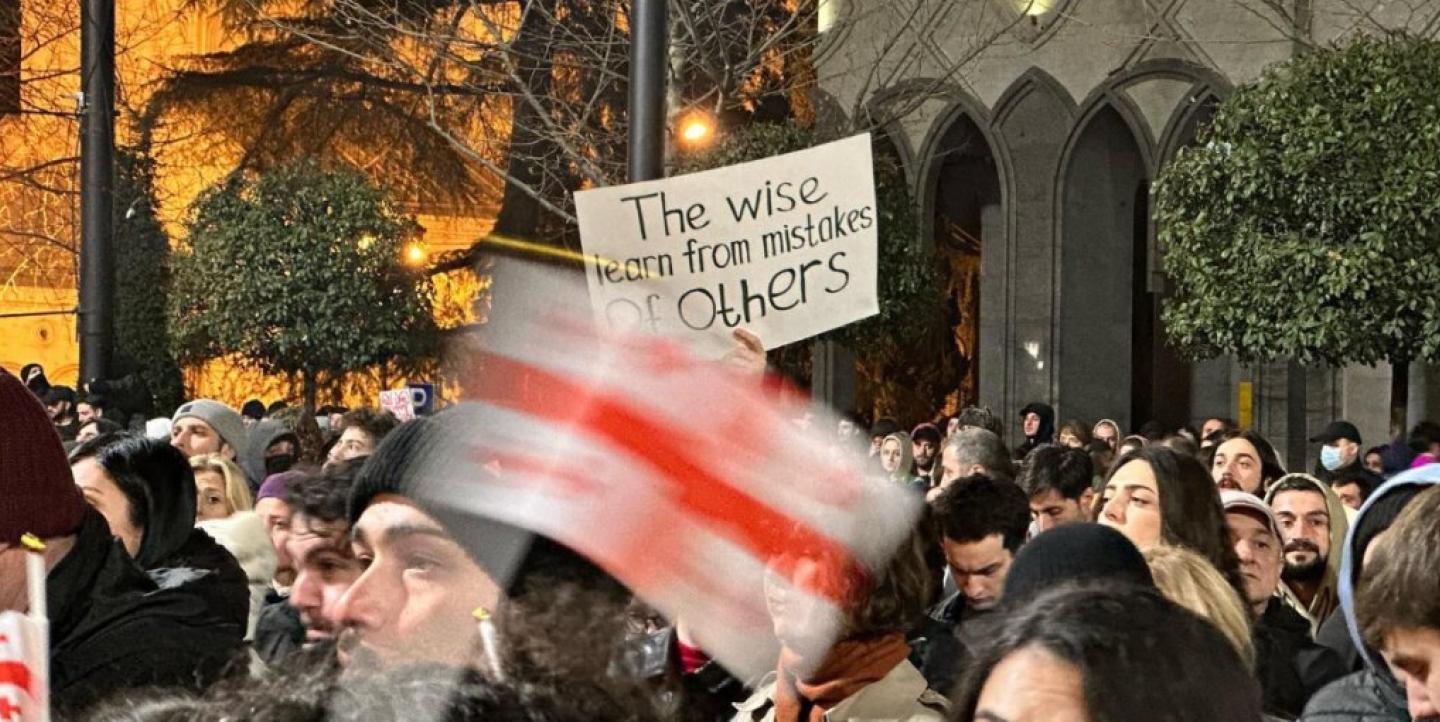In early March, protests broke out in Georgia against the passage of the country’s new Law on Transparency of Foreign Influence, which local civil society and foreign organizations consider analogous to the infamous Russian law on foreign agents. The authorities, who seemed unshakable in their intention to pass the legislation, withdrew it, as a result.
The Law on Transparency of Foreign Influence would have required media and NGOs with more than 20% of their funding originating from foreign donors to register as foreign agents. According to forecasts made by many local and foreign experts and politicians, it would allow control over, and limit the activities of dissidents, and would hinder Georgia’s civil society, democracy and Euro-Atlantic prospects.
The protests against the legislation, involving many thousands of protesters, were held in front of the parliament building in Tbilisi in early March. They were spontaneous and had no direct organizers, but many Georgian media representatives believe that their outlets played a key role in laying the groundwork for them. The outlets had drawn public attention to the legislation, explaining how it could affect the country's future.
Unity and agitation
Independent media were the first to launch a fight against the bill. More than 60 media outlets signed a joint statement stating that they did not intend to work "under a label" and refused to be registered as "agents of foreign influence." If the law passed, this meant, they would either have to close down or make the decision to relocate and register in another country.
Mariam Nikuradze, the co-director of OC Media, which reports on the South Caucasus, said the outlet would consider registering in neighboring Armenia to circumvent the law if it passed.
Against the backdrop of tense relations between Armenia and Azerbaijan, Georgia has remained neutral. Many media and international organizations that carry out work focused on the South Caucasus region, have decided to locate headquarters there, as a result.
"Unanimity among the media and civil society organizations that refuse to register as agents is the only correct approach," said Georgian Charter of Journalistic Ethics representative, Mariam Gogosashvili, who also stressed how independent media shut down in Russia after its law on foreign agents passed.
Georgian journalists also participated in the protests as they covered them, noted Nino Kakhishvili, editor of the Netgazeti. The last time this happened was in 2017, when Azerbaijani dissident journalist Afgan Mukhtarli was kidnapped in Tbilisi.
Netgazeti has received foreign grant funding for more than 10 years. "[Grants] give us the opportunity to create a high-quality media product and at the same time remain independent under any conditions. The law on foreign agents would primarily affect us and other similar media that are critical of the authorities," said Kakhishvili.
Amid the protests, the media sought to inform audiences by explaining the legislation and the consequences its passage would have for ordinary residents of the country.
“We needed to convey the problem to our readers by all available means, touching on its most diverse and non-obvious aspects. We constantly repeated that the authorities want to pass this law in order to silence independent media and thereby drown out critical voices,” said Kakhishvili. “We talked about organizations that receive foreign funding and use that money to help the most vulnerable populations, for example, people with Down syndrome. We gathered interviews and comments from famous people and authorities in various fields across the country, including scientists, athletes and artists. Some of them only learned about the bill after we contacted them for a comment.”
She joked that journalists "literally attacked everyone with the topic" on websites and on social media, emphasizing how the law contradicts Georgia’s move toward Europe.
"Gradually, more and more people began to understand what was happening. Universities, sports clubs, and other organizations began to make protest statements one after another. As a result, on March 7 and 8, thousands of people of all ages came to the parliament, which our authorities obviously didn’t expect,” explained Kakhishvili.
The battle is won – but not the war
Georgian media navigated how to participate in the early March protests while simultaneously reporting on them. The Netgazeti team was divided: some employees participated directly in the rallies, while others covered them. The JAMnews team combined roles, both protesting and reporting.
“We spent all this time in full force on the square in front of the parliament, without going to the editorial office. We filmed and interviewed, then sitting on the steps or on the sidewalk — with our computers on our knees — wrote reports and edited the footage,” recalled JAMnews chief editor Margarita Akhvlediani.
After the special forces used water cannons and tear gas against protesters on March 7, some media published safety instructions at rallies: what clothes to wear, how to protect from tear gas, and more.
The confrontation appeared like it might last for a while. However, in a surprise move on March 9, authorities withdrew the bill.
The protesters may have won the battle, but not the war, Akhvlediani believes: although the draft law was withdrawn, authorities haven’t completely abandoned their goal. “Now there is a real information war going on. The government and pro-government media and bloggers are doing their best to win society over to their side, to convince them that the law on foreign agents will benefit Georgia,” she said. “Independent media now have an even greater responsibility than before — to resist state propaganda, and not let them deceive people. Our task is to explain the context in as much detail as possible. In the end, it’s society that will decide what will happen to the country. And it largely depends on independent media, for society to make the right choice."
For colleagues from other countries who may find themselves in a similar situation, Akhvlediani advises first to overcome the feeling of powerlessness in the face of the propaganda machine.
“Independent media never has a lot of resources like the authorities do. But this doesn’t mean that we are powerless,” she said. “The well-known saying, 'do what you can and come what may' is very handy here. We can inform the public and try to convince as many people as possible, including other journalists as well."
Pictured: Protests in Tbilisi, photo courtesy of JAMnews.
This article was originally published on our Russian site. It was translated into English by Nick Flynt.


